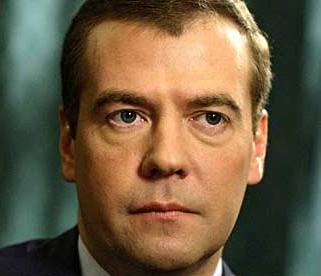
Solomonov Attacks Defense Ministry for Holding Back Funds
Publication: Eurasia Daily Monitor Volume: 8 Issue: 130
By:

On July 6, Dmitry Medvedev was chairing a routine video-link conference from his country residence near Moscow with ministers and governors about the implementation of presidential initiatives to build kindergartens, helping young families with children and promoting state-sponsored primary military cadet academies for teenagers in all the regions of Russia. Medvedev was joking and seemingly in a good mood, the official conference agenda seemed exhausted and suddenly the president startled journalists and officials by announcing: “I have just read that the state military procurement program for 2011 has been wrecked.” Defense Minister Anatoliy Serdyukov was participating in the video-link conference to discuss the primary military cadet academies issue from Sochi, where he was attending a summit of CIS defense ministers. Medvedev called out: “Anatoly Eduardovich, are you there? I demand you report with commentaries in three days and get rid of any officials that are responsible – you hear me?” If the reports are wrong, continued Medvedev, those who spread panic must be punished too. “In wartime panic-mongers were executed by firing squad, understand?” barked out Medvedev, while announcing he was fed up with problems concerning the military procurement program. The president closed the conference on a cheerful note: “Thanks to all – you are not panic-mongers, yet” (www.kremlin.ru, July 6).
Medvedev’s sudden outburst was provoked due to an interview by the main designer of Russia’s modern sea and land based ballistic missiles – the Bulava, the SS-27 Topol-M and RS-24 Yars Yuri Solomonov (65) – published on the same day by Kommersant (July 6). Last week the Bulava R-30 3M30 (SS-NX-30) sea-launched ballistic missile (SLBM) was successfully launched for the first time from a brand-new Borei-class (project 955) nuclear strategic submarine Yuri Dolgoruky. The development of the Bulava since 2005 was marred by continuous failures and disasters. The failures forced Solomonov to resign in 2009 as general director of Russia’s main strategic ballistic missile research and development facility – the Moscow Institute of Teploteckhnika (MIT) – though he continued to be the Bulava’s chief designer (EDM, June 30).
Clearly emboldened by the latest Bulava successes, Solomonov lashed out at the defense ministry, accusing it of incompetence and organizational impotence that is undermining national security. Contracts to finance ICBM and SLBM production in 2011 have not been signed with the defense ministry. Half the present financial year’s over-budget funds to make new Yars and Bulava missiles have not been released, crippling procurement plans. Solomonov complained that production of special fiber to make the hulls of solid fuel ICBMs and SLBMs is faltering in Russia and that an unneeded confrontation with the West over US and NATO plans to create ballistic missile defense (BMD) in Europe is hampering the procurement of advanced Western-made electronic components needed to make Russian ICBMs. Solomonov characterized as “nonsense” the official position of the defense ministry that Iran and North Korea do not pose a potential missile threat. According to Solomonov, no US BMD will ever be able to stop the ICBMs designed by him and the MIT. Solomonov ridiculed plans to develop and deploy a new, heavy, liquid-fuel, silo-based ICBM to replace the aging SS-18, stating it is a charitable program to give work to designers from the Makeyev missile center based in Miass in the Urals, since they cannot make anything better or modern (Kommersant, July 6).
Visibly stunned by Medvedev’s tongue-lashing, Serdyukov soon recovered and fought back, telling journalists in Sochi that the defense ministry indeed did not sign contracts for 2011 with Solomonov’s MIT, because their procurement prices “were growing outrageously.” According to Serdyukov, the defense ministry arms procurement budget in 2011 is 581.5 billion rubles ($21 billion) of which contracts worth 108 billion ($3.9 billion) have not been signed yet with defense contractors “that have substantially inflated their prices.” Serdyukov mentioned MIT, the United Shipbuilding Company and the Almaz-Antei antiaircraft missile makers. Serdyukov asserted Solomonov published his accusations to put pressure on the defense ministry in the process of bargaining and accused the MIT of inflating “the price of one of its items by 3.9 billion [rubles] ($140 million) and the other – by 5.6 billion [rubles] ($200 million)” (RIA Novosti, June 6).
The “items” would seem to be RS-24 and Bulava ballistic missiles, but Serdyukov did not elaborate about the exact price per item or their number. In Russia the defense procurement budget is secret and closed to any public scrutiny. The defense ministry and industry exchange blame: one side plans Russian armaments that are outdated and overpriced, while the other states the opposite and it is impossible to fully believe anyone, though it is clear that the cloak of semi-total secrecy is a breeding ground for massive misappropriation.
Last week Serdyukov disclosed to journalists an astonishing figure: the Sevmash shipyard in Severodvinsk near Arkhangelsk that builds nuclear submarines wants to charge a staggering 347 billion rubles ($12.4 billion) per submarine, while the defense ministry is ready to pay 112 billion rubles ($4 billion) (VPK, July 6). Apparently, Serdyukov was talking about the new Borei-class submarine. If Serdyukov’s figure is accurate, the overpricing and misappropriation involved are mindboggling: for the price of one domestically built submarine Russia could have ordered from France some 15 new Mistral-class helicopter assault ships (two have been purchased for 1.2 billion Euros) or two Nimitz-class nuclear carriers in the US. The defense ministry offer of 112 billion rubles, though 3 times smaller, seems equally too costly.
Medvedev sounded angry and confused, not understanding clearly what to do to revive and reform Russia, or who to execute by firing squad: Serdyukov, or Solomonov, or both, or someone else. His frustration is exasperated by the humiliation of not being allowed by Prime Minister Vladimir Putin to declare his intention to run for president as the election next March is approaching. No one is taking Medvedev seriously, he seems to have the authority to yell angrily at Serdyukov and other top ministers, but cannot make them do his bidding.




